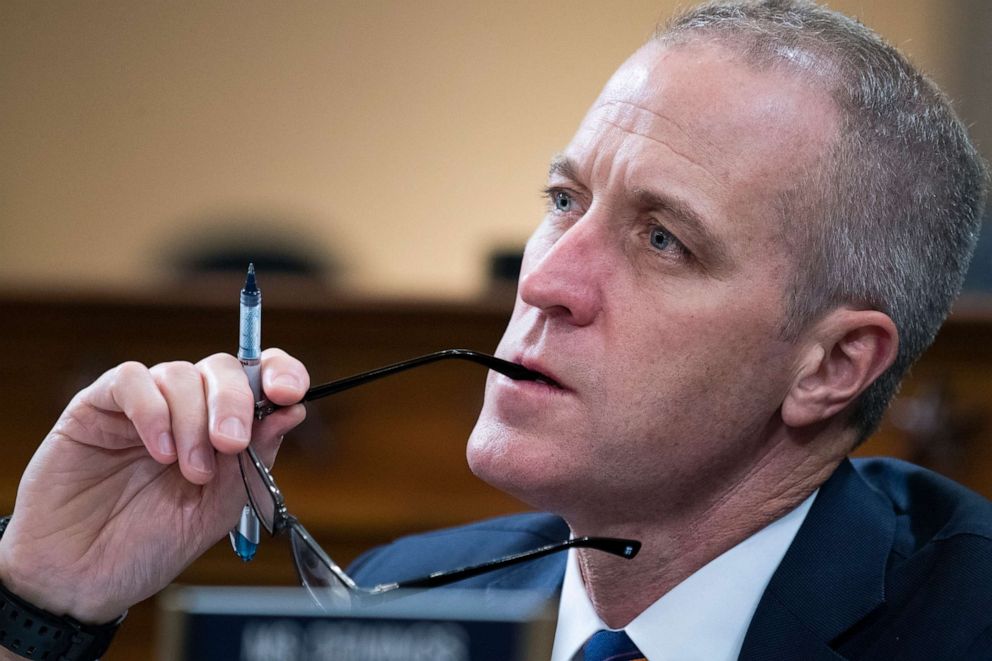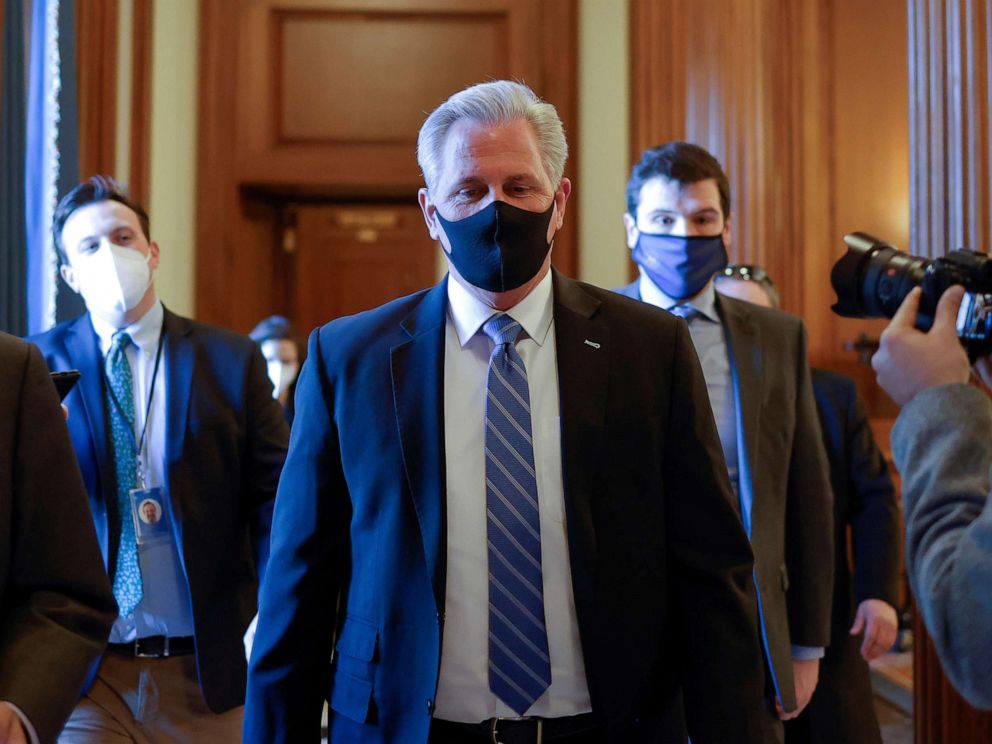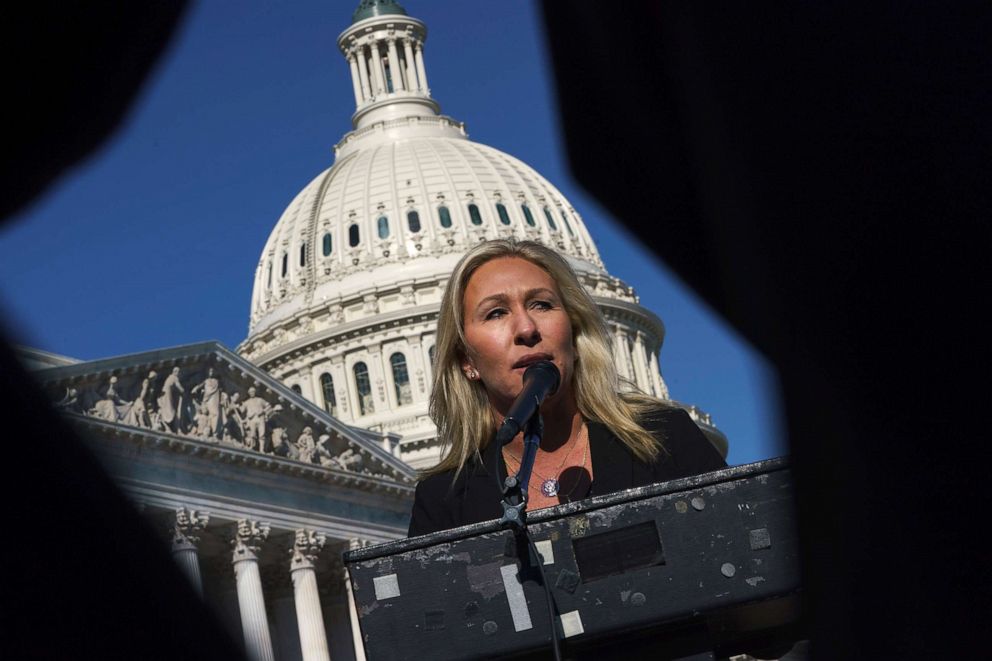GOP on defense as Democrats harness party's ties to extremism
Democrats are launching their 2022 efforts with ad buys focused on QAnon.
The start of President Donald Trump's second Senate impeachment trial over a single charge of inciting an insurrection at the U.S. Capitol arrives as the Republican Party is under siege.
As the GOP contends with its future and Trump's role in it, Democrats are seizing on the deep divisions within the Republican ranks over its right wing and seeking to define the frontline of the party by its most extreme members.
House Democrats' campaign apparatus deployed $500,000 for an advertising campaign tethering Rep. Kevin McCarthy, R-Calif., the minority leader, and seven vulnerable House Republicans in districts President Joe Biden won last year to Georgia Rep. Marjorie Taylor Greene's extremist rhetoric and the QAnon conspiracy theory.
The opening shot by Democrats accuses the swing district Republicans of standing "with Q, not you."
"Washington Republicans have made their choice -- they chose to cave to the murderous QAnon mob that has taken over their party," said Rep. Sean Patrick Maloney, D-N.Y., the chair of the Democratic Congressional Campaign Committee. They are "refusing to hold those responsible for the attack on the Capitol accountable, offering nothing but empty words after years of hyping up lies and conspiracy theories."

The Washington Post's fact checker wrote that the effort to tie the members to the conspiracy theory is "misleading" but all eight voted against Trump's second impeachment, brought on by the former president's own rhetoric before a mob of his supporters marched to the Capitol in an effort to thwart the certification of Biden's victory. And while some criticized Trump's conduct, a smaller number of them voted against certifying the electoral votes from at least one of two battlegrounds -- Arizona and Pennsylvania -- based on baseless claims of fraud repeatedly espoused by Trump and the far-right flank.
"We've got to hold these Republicans accountable," said former Democratic Rep. Donna Shalala, who lost her Miami-based district last year to now-Rep. Maria Elvira Salazar, one of the Republicans targeted in Democrats' new ads.
Democratic strategist Ian Russell called the early pitch to voters a messaging "road test," and praised Maloney for the early onslaught.
"I think it's a smart move," Russell told ABC News on Monday. "Chairman Maloney is capitalizing on the fracture lines inside the Republican Party. They've got cracks in their coalition and he's taking a crowbar to them, and demonstrating to the American people, demonstrating to voters, that Republicans are on the side of dangerous extremists who stormed the Capitol, who hold all these views that are not going to go down well in districts across America."
As Republicans fend off the attacks from Democrats under the newly installed chair, they are also reckoning with how to reconcile their differences internally in the post-Trump era.

Their ability to unite over the next two years, some strategists say, will be crucial to determining their success in reclaiming the majority they lost in the 2018 midterm elections.
"The Republican brand has been battered by Trump and some of the recent extremism ... that's been an outgrowth of Trumpism," said Ken Spain, a former top official at the National Republican Congressional Committee. "Republicans need to coalesce around an economic argument that is likely going to resonate with voters two years from now.
Even with Democrats taking a page out of their playbook, the GOP is making clear their plans to continue the culture war offensive against their rivals.
"We are going to continue hammering House Democrats for their job-killing, socialist agenda and leave elevating fringe conspiracies to the DCCC," Michael McAdams, the communications director for the NRCC, said in a statement indicating the campaign arm will stick to its 2020 strategy.
Throughout the last cycle, the GOP relentlessly branded Democratic candidates as the party of "defund the police" in an effort to cast the more moderate members in lockstep with the progressive wing, the party dramatically narrowed House Democrats' majority.
Shalala conceded that Republicans' strategy "certainly was" effective in drowning out Democrats' health care-centric message from the last cycle. Looking to the future, when the party defends its razor-thin margin next year, Democrats must give voters a reason to vote for them and not just against Republicans, she said.
"Campaigns are not about the candidates. They're about improving people's lives," she said. "We can't win by tying every Republican just to the right wing."
"We've got to have substantive things that we've done. And since we control both houses, as well as the presidency, Democrats are going to be able to say, 'look, this is what happens when you elect Democrats. You're throwing away your vote if you elect a Republican,'" she continued.
Shalala highlighted Biden's $1.9 trillion coronavirus relief package, which congressional Democrats are in the process of crafting, as a resonating issue and one of the ways Democrats are improving the lives of their constituents.
"And Democrats will get total credit for it," she said.
The move by Democrats to capitalize on open wounds within the Republican caucus comes as they hunt for a new polarizing figure after Trump, one that can be as unifying and energizing for the base as the former president.
"With Trump fading from the scene, Democrats are in need of a Boogeyman, or in this case, a woman," Spain said.
But similar to Shalala, the Republican strategist isn't convinced the inaugural strategy by Democrats will sway voters on its own.
"It's likely to make a few Republicans squirm," Spain said, "but ultimately you're tying one obscure member's actions to an entire party and that's going to be difficult to do."
Spain compared the Democrats' efforts to a similar campaign they waged in 2009 when "Democrats tried to tie Republican members to Sarah Palin (and) the 2010 elections had nothing to do with Sarah Palin."
"This is unlikely to have a meaningful impact on the outcome of the 2022 elections," he continued, with Democrats controlling all three levers of power. "2022 will be a referendum on Joe Biden and Democrats in Congress. Period."
But that one obscure member has caused headaches for the GOP and reflects the larger rift within the party over whether they should continue to align with Trump or move on from him.

Last week, McCarthy decided not to punish Greene, who said she spoke with Trump and was "grateful for his support" at the height of calls for her expulsion for her history of incendiary comments -- ranging from endorsing violence against Democrats, spreading false claims about school shootings, and espousing QAnon conspiracy theories. Greene has since expressed regret for some of her past comments from the House floor, but never offered an explicit apology for her conduct.
Senate Majority Leader Mitch McConnell's approach, meanwhile, diverged from his counterpart in the House. He suggested that Greene's embrace of conspiracy theories amounted to a "cancer" on the party. McCarthy left it to Democrats to penalize the freshman firebrand, and Greene was stripped of her committees in a vote by the full House, in which 11 Republicans broke ranks and joined Democrats to remove her from two committee assignments.
Russell said the GOP doesn't seem to be reevaluating after losing the White House and the Senate or ridding themselves of their former leader.
"Both parties after losing a national election dust themselves off ... and figure out a path back," he said. "What you've seen since the election, though, is the Republicans double down on Trumpian chaos. Marjorie Taylor Greene, QAnon, those are all symptoms of the underlying disease, which is this chaos that's at the heart -- that's taken over modern conservatism, and the modern Republican Party."
"That's all they've got in the gas tank right now," he said of the embrace of Trumpian politics. "And this won't get them very far."
Party leaders may be staying on course, but in the eyes of Americans, the GOP is facing a broader perception issue with their extremist factions.
In a new ABC News/Ipsos poll, Americans say there are more radical extremists within the GOP than the Democratic Party by a 17-point margin. And far more Democrats -- 80% -- think there are more radical extremists in the GOP than in their own, while 57% of Republicans say the same about the Democratic Party.
Further complicating the problems for Republicans is the stream of retirements from within their conference, most recently from Republican Sens. Rob Portman and Richard Shelby, two establishment figures within the party. They are not likely to be the last, Russell said, as the announcements are spurring predictions of more Republican retirements in the months to come.
"With the center of gravity in the House conferences so far to the right, it's going to become an increasingly difficult place for traditional conservatives," Russell said. "It would not surprise me if you're going to see some of the some of the longer-term members ... realize that this is not an environment with which they can get anything done."




